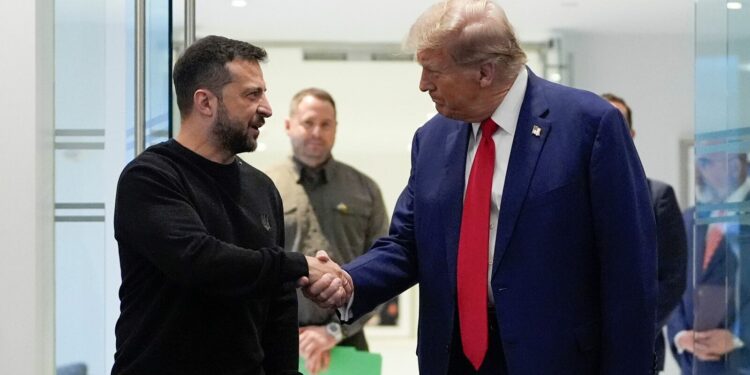View Full Image
Hungary’s Viktor Orban has urged Europe to shift to Trump’s strategy of seeking a swift end to the war. Photo: Attila Kisbenedek/Agence France-Presse/Getty Images
While the current German government has made clear it is against Ukraine’s entry into NATO in coming years, it is unclear if other European allies would go along with that, however, even if they agree that there is a need to start end-of-war talks.
Scholz spoke with Putin on Friday, a spokesman for the German leader said, the first time the two men had spoken in almost two years.
While Scholz condemned Moscow’s continued war on Ukraine and urged Putin to withdraw his troops, reiterating Germany’s longstanding position on the war, according to the spokesman, the call was notable in marking the resumption of direct contacts between Putin and the West.
During the exchange, Scholz urged Putin to enter negotiations with Ukraine aimed at achieving a just and durable piece, the spokesman said. Scholz reiterated Germany’s determination to continue supporting Ukraine against Russia’s aggression.
After the call, the Kremlin said Moscow had long been ready to negotiate an agreement to end the conflict and that “should take into account the security interests of the Russian Federation, proceed from the new territorial realities and…address the root causes of the conflict.”

View Full Image
Kyiv residents took shelter in a subway station last month. Photo: Anatolii Stepanov/Agence France-Presse/Getty Images
The statement alluded to Russia’s position that Ukraine should recognize Russia’s territorial gains in Ukraine and give assurances of neutrality going forward.
At a summit in Budapest last week, European leaders discussed for the first time what to do if the U.S. shut off assistance to Ukraine after Trump takes office in January.
However, after a series of phone calls with the president-elect, European officials struck a somewhat more optimistic note, saying that while Trump appeared determined to seek a diplomatic end to the fighting, he was receptive to warnings that he must extract real concessions from Putin and that showing weakness in Ukraine could encourage Moscow’s ally China to be more aggressive in its region.
In most capitals, the formal message remains that Europe will support Ukraine as long as necessary. That is a view firmly supported in some countries such as Poland, the Baltic states and Scandinavian states. But there was caution from French President Emmanuel Macron and Italian Prime Minister Giorgia Meloni in the Budapest discussions about whether Europe could provide the military, budget and humanitarian assistance Ukraine needs if Trump cuts U.S. funding.
Hungarian Prime Minister Viktor Orban has long been calling for Europe to shift to Trump’s strategy of seeking a swift end to the war. His argument that Europe lacks a realistic strategy for achieving what it says it wants—a Ukrainian victory recovering its territory—is being echoed even in countries that are far more supportive of Kyiv.
Indeed, even in some of Europe’s more supportive capitals, the hope now is that Ukraine can prevent Russia from winning the war despite the huge cost to Moscow in human and economic terms. That would preserve an independent Ukraine, even if territory has to be ceded for now. An earlier end to the fighting appears more likely to secure that goal, some diplomats say.
Yet there are real concerns in Europe as well.
There is uncertainty about what the president-elect will settle for in talks if Putin doesn’t engage seriously in negotiations and seeks to tighten Moscow’s grip on Ukraine, a scenario that senior U.S. and European officials believe is likely.
If Ukraine is kept out of NATO, European officials say Ukraine must be provided with sufficient military support so that it can fend off future Russian attacks—and the officials want to see the U.S. continue to support those efforts. They also want to ensure that both Ukraine and Europe have a seat at the table in deciding the fate of the conflict and Europe’s future security.
Some senior European diplomats have told their capitals they also need to be prepared for a possible Trump push for European troops to provide security guarantees for Ukraine and to monitor the cease-fire on the Ukrainian side of a contact line, which could stretch hundreds of miles.
Any such decision could be politically challenging for European governments, including Europe’s nuclear powers, Britain and France. Doing so without any U.S. involvement or pledge of support if Russia resumes the war in future would make such a step even riskier.
Bertrand Benoit contributed to this article.
Write to Laurence Norman at [email protected] and Alexander Ward at [email protected]
Source link : http://www.bing.com/news/apiclick.aspx?ref=FexRss&aid=&tid=6739ec60a55f450ebd6cffec66668825&url=https%3A%2F%2Fwww.livemint.com%2Fpolitics%2Ftrumps-push-for-ukraine-peace-finds-growing-acceptance-in-europe-11731835187064.html&c=7516888062104561834&mkt=de-de
Author :
Publish date : 2024-11-17 01:58:00
Copyright for syndicated content belongs to the linked Source.



